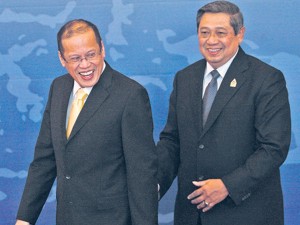Aquino arrives late at Bali summit

LATE ARRIVAL President Aquino (left) is greeted by Indonesian President Susilo Bambang Yudhoyono upon his arrival at the Asean Summit in Nusa Dua, Bali, Indonesia, on Thursday. The Philippine leader deferred his departure for Bali due to a political crisis in Manila. AP
BALI, Indonesia—President Aquino is grappling with a lukewarm response to Philippine moves to end tensions with China over conflicting claims to the Spratly Islands.
Delayed by a domestic problem at home, Aquino arrived Thursday noon, missing the opening ceremony and the plenary session of the 19th Association of Southeast Asian Nations (Asean) Summit, but just in time for the retreat session at 1:20 p.m. and the concluding session at 3:30 p.m.
He later joined other leaders in the signing of the Bali Declaration on Asean Community in a Global Community of Nations.
Foreign journalists asked if the President’s late arrival was prompted by the cool response from other Asean members to the Philippine proposal to turn the West Philippine Sea (South China Sea) into a zone of peace, freedom, friendship and cooperation (ZOPFFC).
Communications Secretary Ricky Carandang, who stood in for Aquino at the plenary session, explained that the President had been tied up by the controversy involving former President and now Pampanga Representative Gloria Macapagal-Arroyo, who was barred from traveling to Singapore purportedly for a medical treatment.
“He’s presently engaged in the retreat session and he will be here for the duration of the summit and all the other meetings that were scheduled,” Carandang told journalists at the Bali Nusa Dua Convention Center, squelching speculations that Aquino would cut short his stay here and depart for Manila on Friday.
The Philippines believed that ZOPFFC was an actionable framework to segregate disputed areas in the West Philippine Sea to allow countries to freely and jointly develop undisputed areas. It was presented at the Asean foreign ministers’ meeting and it was merely “noted.” China, which has advocated one-on-one talks with claimant-countries, has opposed this multilateral approach.
Ahead of the summit, Indonesian Foreign Minister and Asean chair Marty Natalegawa said the Manila proposal should be in line with the Asean’s Declaration of Conduct on the South China Sea. He said Manila’s calling the disputed waters West Philippine Sea contrasted with the use of the South China Sea by a wider community. He said claimant countries should use noncontroversial approach to ease tension in the area.
The Spratlys, believed to be sitting atop vast reserves of gas and oil and straddling commercial sea lanes, have been a flash point for conflict, and an irritant between China, the Philippines, Vietnam, Taiwan, Malaysia and Brunei, which have overlapping claims over the islands.
Carandang read the Philippine position at the morning plenary session, an issue that was expected to be raised on Saturday at the East Asia Summit, which groups Asean, plus Australia, China, India, Japan, New Zealand and South Korea, and new members US and Russia.
“We want to have a rules-based approach to it—legal approach,” he said, pointing to the ZOPFFC.
Carandang said nothing conclusive had been reached in the discussions of the proposal with other Asean members. “It’s still a work in progress.”
He dismissed suggestions that the Philippines was using Asean in its territorial dispute with China. “Many of the claimants are Asean countries, so you can’t remove Asean from the equation,” he said. “Also, Asean is not adjudicating any of these issues. There’s no adjudication process that’s being undertaken in Asean for the South China Sea issue,” he said.
“We’ve always said that the territorial issues should be resolved through the rule of law and one of those laws is the Law of the Sea. So bringing the issue before the Unclos [UN Convention on the Law of the Sea] has always been an option for us,” he added.
On perception that Manila was using the summit to push its neighbors to stand against China, Carandang said that the regional grouping “works by consensus.”
“We believe that if we speak with, as much as possible, a common voice then that voice will be stronger. So it’s simply that,” he said.
Carandang acknowledged that US President Barack Obama’s decision to increase US presence in Australia by deploying 2,500 more American troops there to countenance China’s growing assertiveness would boost the Philippine position on the Spratlys.
“We view the presence of the Americans here—the renewed engagement of the United States here—as ultimately a stabilizing force and we welcome that,” he said. “I think ultimately a greater US engagement in the region will lead to more stability.”
Carandang denied that the Philippines was splitting off from its neighbors in backing US presence in the Asia-Pacific region, saying “Asean countries have different perspectives on different issues … I wouldn’t characterize it as a growing rift. Not at all.”
The Philippines has gained the support from the United States in the escalating tension over the West Philippine Sea.
During a whirlwind visit to Manila to mark the anniversary of RP-US Mutual Defense Treaty, US Secretary of State Hillary Clinton warned on Wednesday claimant-countries against asserting their territorial claim “through intimidation or coercion.”
Aquino is holding a bilateral meeting with Obama on Friday morning. Both leaders are cohosting the Asean-US Leaders’ Summit later in the day.